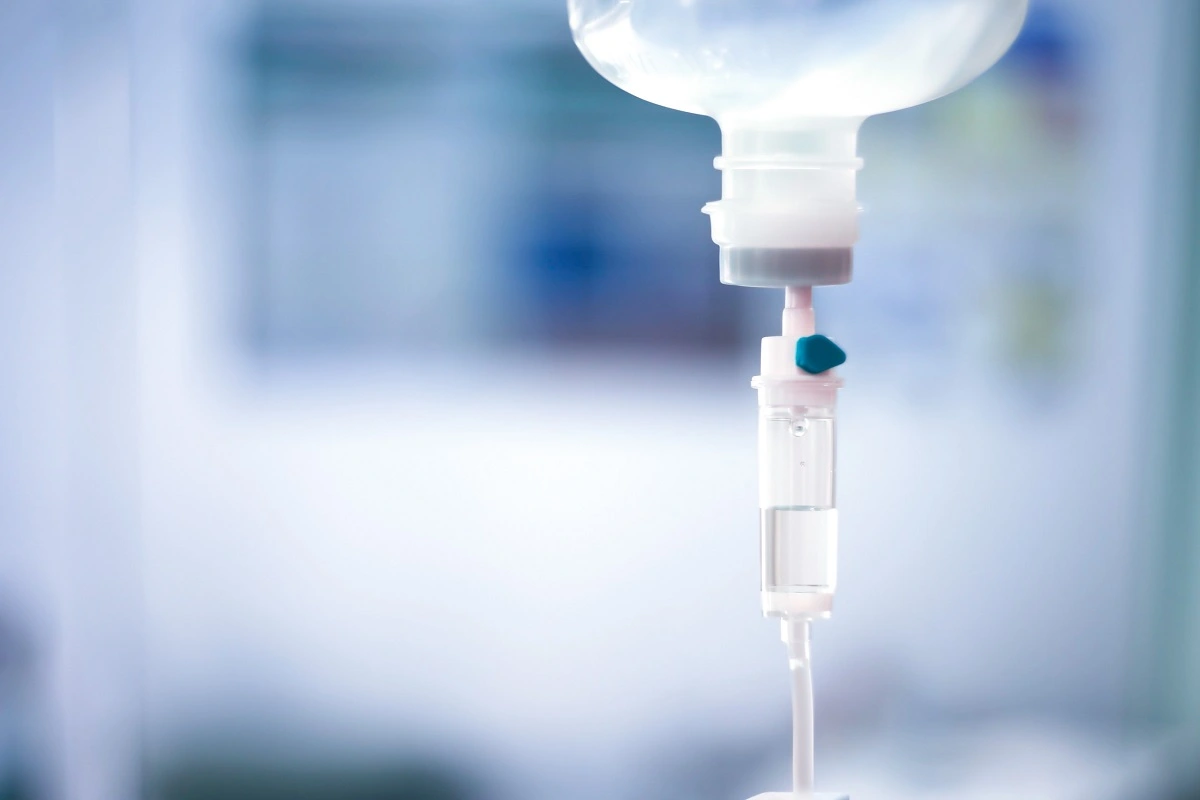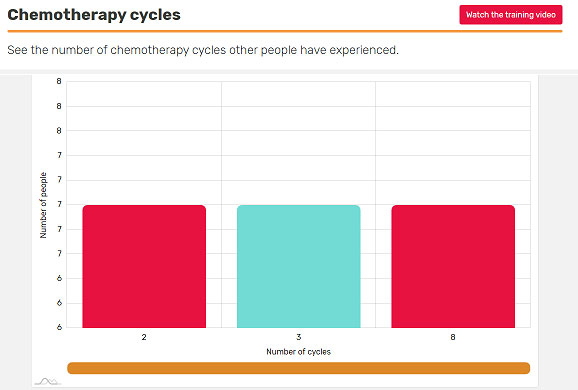Chemotherapy side-effects
There can be some unpleasant chemotherapy side-effects during treatment. But, these usually don’t last longer than the chemotherapy itself. And, many can be prevented or managed during treatment.
On this page, we’ll cover:
- What causes chemotherapy side-effects?
- Common chemotherapy side-effects
- Less common chemotherapy side-effects

What causes chemotherapy side-effects?
Chemotherapy is the use of cytotoxic (anti-cancer) drugs to destroy tumour cells by disturbing their growth. But the drugs temporarily act on healthy cells as well as tumour cells. This can lead to some unpleasant short-term chemotherapy side-effects.
Chemotherapy acts on rapidly or frequently dividing cells. Any cells in the body that divide frequently are therefore vulnerable to chemotherapy. These include skin and hair cells and those lining the digestive system. This is why these parts of the body are often affected by chemotherapy.
Side-effects vary from person to person and from drug to drug. Your oncologist will explain the side- effects to you when discussing your chemotherapy treatment.

Common chemotherapy side-effects
-
Anaemia is a relatively common side-effect of chemotherapy. This is because chemotherapy can temporarily lower the number of your red blood cells. These carry oxygen around the body in a substance called haemoglobin (Hb).
Symptoms of anaemia include extreme tiredness, shortness of breath and an irregular heartbeat.
If you have any of these symptoms, tell your healthcare team as soon as possible. You may need to have a blood transfusion to increase the number of red blood cells, or take a medicine that can help your body produce more red blood cells.
Iron is needed to produce the haemoglobin, which carries the oxygen around the body. So eating a diet high in iron can help to maintain the level of haemoglobin in your blood.
Foods high in iron include dark green leafy vegetables (such as broccoli and watercress), beans, nuts, meat and dried fruits (such as apricots and raisins).
-
Chemotherapy can also cause digestive problems, like constipation or diarrhoea. It’s important you try to eat healthily and drink plenty of fluids, even if you don’t feel like it.
Your healthcare team may be able to recommend suitable medicines to help relieve the symptoms or you could try making changes to your diet.
-
It’s possible that your skin may become dry and sore, particularly on your hands and feet. Your nails may also become dry and brittle.
Some chemotherapy drugs can cause your skin to become more sensitive to sunlight (and to chlorine), both during chemotherapy and for some time afterwards.
So it’s important to make sure that your skin is protected from the sun. You should:
- use a sunscreen that blocks both UVA and UVB rays, at least SPF (sun protection factor) 30-50
- keep covered up
- avoid going out in the sun in the hottest part of the day (10am-4pm)
-
Many people experience fatigue following chemotherapy.
Chemotherapy can reduce the production of your red blood cells, leading to a condition called anaemia. The red blood cells contain a protein called haemoglobin that carries oxygen around your body allowing your muscles to work. So, a reduction in haemoglobin levels can leave you feeling very tired.
As a result, in between cycles of chemotherapy, many people have periods where the tiredness gets gradually worse, but then improves to its lowest level just before the next round of chemotherapy.
Your doctor can check for anaemia with a blood test and advise on treatment if appropriate.
Some research has also shown that the body needs energy to repair itself after treatment and that the immune system needs to adapt. This can drain energy as the body redirects its resources towards healing.
-
Not all chemotherapy causes hair loss. It really depends on which drug or combination of drugs you have. Some drugs result in no hair loss at all, or only a very small amount. Most chemotherapy drugs used for brain tumours don’t cause complete alopecia (hair loss), but may thin hair.
Generally, any hair loss (thinning) will start within a few weeks of treatment beginning.
Once treatment has finished, hair should begin to grow back over the next few months, but it may be different to how it was previously, e.g. a different texture or colour.
However, if you’re also having radiotherapy, this may be the main cause of your hair loss, rather than the chemotherapy. As such, the loss in the areas affected by the radiotherapy beam may be more permanent.
A list of organisations that sell wigs and other headwear is included in our downloadable information about chemotherapy
You may be entitled to an NHS free synthetic wig.
-
Platelets are tiny cells that help the blood to clot. This is important in repairing damaged blood vessels, e.g. if you cut yourself. A low platelet count (level) can therefore increase the risk of bleeding.
Signs of a low platelet count include:
- nosebleeds
- bleeding gums
- heavy periods
- bruising
- tiny blood spots in the skin, known as petechiae.
You should tell your healthcare team straight away if you have any of these symptoms.
Platelets can also be lowered by some blood thinning treatments that may be given after surgery. These are given when people are prone to potentially harmful blood clotting, due to their lack of activity. If you’re given these, you’ll need to be monitored carefully.
-
Chemotherapy can temporarily lower the number of white blood cells in your body. White blood cells play a vital role in fighting infection, so you may be more susceptible to infections during this time.
The most common type of white blood cell is called a neutrophil, so you may hear this called neutropenia.
Your health team will monitor you and give you antibiotics to help fight infection if necessary.
If you have a temperature over 37.5 degrees or are feeling unwell, always seek advice from your healthcare team.
-
Some people may experience nausea or actually vomit after treatment. Not all chemotherapy drugs cause this and some people experience no sickness at all.
Your healthcare team can give you some anti-sickness tablets (known as anti-emetics) if you’re affected by nausea. You may also be given anti-emetics if the particular chemotherapy drugs you’re going to receive are known to cause nausea and vomiting.
Changing your diet can also help reduce the impact of this side-effect.
-
This is caused by the chemotherapy drug affecting the nerves and is called peripheral neuropathy. You may also find fiddly tasks, such as fastening buttons, difficult.
Occasionally this effect can be permanent. Let your healthcare team know if you get these symptoms – they may need to lower the dose.
-
Some chemotherapy drugs, such as procarbazine, can react with alcohol (and non-alcoholic beers and wine), causing sickness, dizziness or breathlessness.
When you’re taking these drugs, and for about 2 weeks afterwards, it’s best to avoid these types of drink.
Some chemotherapy medication, particularly procarbazine, can cause an allergic reaction rash when taken with alcohol or some foods. You should avoid foods such as mature cheeses, salami, and yeast or beef extracts (Oxo®, Bovril® and Marmite®).
This reaction can occur while you’re taking the tablets or after you’ve stopped taking them.
If you get a reaction, it’s important that you stop taking the tablets and contact your healthcare team.
-
Oral mucositis (inflammation of the inside of the mouth) is a possible side-effect of chemotherapy that’s more likely with high doses.
Some people say it feels like burning your mouth from eating or drinking something too hot.
Symptoms of mucositis usually begin 7-10 days after you start chemotherapy, but will usually clear up on their own within a few weeks after treatment has ended.
If you experience oral mucositis, you may also suffer from ulcers in your mouth or on your tongue and lips. This can be very unpleasant. It’s possible for ulcers to bleed and become infected, particularly as your immunity may also be lowered from the chemotherapy. This can make it difficult to eat, drink and talk.
It’s also common to get oral thrush related to the treatment and to steroids. This usually appears as a white or discoloured coating on your tongue and the insides of your cheeks, and food often seems to taste differently.
If this occurs, or you’re concerned about oral mucositis, it’s important to seek medical advice from your healthcare team. They may be able to prescribe medicine that can relieve the symptoms or suggest changes to your diet that may be able to help.
-
Sometimes, chemotherapy can affect your sense of taste and make eating less enjoyable. You can change your diet to help lessen the impact of this side-effect.
Taste changes, along with other side-effects of chemotherapy, can also cause you to have a reduced appetite. If this happens to you, you should speak to your healthcare team, as they may be able to recommend suitable medicines.
You could also change your diet to help increase your appetite.
Less common chemotherapy side-effects
Chemotherapy can sometimes bring on less common side-effects. These might affect other organs, such as the lungs, liver or kidneys.
Some of these cause symptoms, but others can only be detected by blood tests, which you’ll have during your treatment. Your oncologist will go through these possibilities with you.
Helping you recover from chemotherapy
How many cycles of chemotherapy can you expect?
If you’re about to have chemotherapy, or you’ve been told you’re not having it, you may wonder if this is usual in your situation. Find out with BRIAN’s Chemotherapy cycles insight, which you can filter to make it relevant to you.

More information
Chemotherapy for adults factsheet – PDF
Download our printable information about chemotherapy.
Chemotherapy for adults – Clear print factsheet – PDF
Download our printable information about chemotherapy in a clear print format.
Support and Information Services
Research & Clinical Trials Information
You can also join our active online community.
In this section

Get support
If you need someone to talk to or advice on where to get help, our Support and Information team is available by phone, email or live-chat.
Recommended reading
Share your experiences and help create change
By taking part in our Improving Brain Tumour Care surveys and sharing your experiences, you can help us improve treatment and care for everyone affected by a brain tumour.